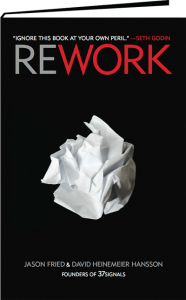Are You A Workaholic?
 I recently read (ok, I actually listened to it on my iPod) a book called Rework. The book is by Jason Fried and David Heinemeier Hansson who are the founders of 37Signals. I particularly enjoyed the book and found their take on work and entrepreneurism refreshing, logical and, personally, quite freeing. My take on it is, just because everyone else is doing it ‘that way’ doesn’t mean you have to do it ‘that way’ or even that ‘that way’ is such a good way to be going about things at all. Jason and David have forged their own business style and culture, creating a business which suits them at this moment, and are leading the business into the future without the automatic assumption that ‘the future’ means ‘growth’ or ‘expansion’. Actually, it may mean ‘staying small’ or ‘reduction’.
I recently read (ok, I actually listened to it on my iPod) a book called Rework. The book is by Jason Fried and David Heinemeier Hansson who are the founders of 37Signals. I particularly enjoyed the book and found their take on work and entrepreneurism refreshing, logical and, personally, quite freeing. My take on it is, just because everyone else is doing it ‘that way’ doesn’t mean you have to do it ‘that way’ or even that ‘that way’ is such a good way to be going about things at all. Jason and David have forged their own business style and culture, creating a business which suits them at this moment, and are leading the business into the future without the automatic assumption that ‘the future’ means ‘growth’ or ‘expansion’. Actually, it may mean ‘staying small’ or ‘reduction’.
One chapter which I felt was particularly relevant to our readers was that titled ‘Workaholism’. They really hit the nail on the head for me in their first paragraph:
“Our culture celebrates the idea of the workaholic. We hear about people burning the midnight oil. They pull all-nighters and sleep at the office. It’s considered a badge of honor to kill yourself over a project. No amount of work is too much work.”
How many of you have worked in an organisation where your contract may say that your work hours are 9am – 5pm with a half hour lunch break, but it was somehow expected that you actually worked from 8am – 6pm, and that you ate lunch at your desk while checking your emails or proof reading a report? I have experienced this in my own work life and it both amazed and frustrated me. Luckily I was a casual staff member who, being paid by the hour only worked the amount needed to get the job done. However, those who were on a salary had an invisible line in their contract that says, if you want to be a part of this team and to be seen to be pulling your weight, you need to start earlier and work later, whether you have enough work to do or not. As quoted in Rework:
“Not only is this workaholism unnecessary, it’s stupid. Working more doesn’t mean you care more or get more done. It just means you work more……….Workaholics make the people who don’t stay late feel inadequate for “merely” working reasonable hours. That leads to guilt and poor morale all around. Plus, it leads to an ass-in-seat mentality – people stay late out of obligation, even if they aren’t really being productive.”
How does your organisation gauge whether an employee is being productive? Is it based on how many nights they stay late? Do you encourage your staff to stay late through your own actions? Do you feel that to get ahead, you need to be at your desk before your boss gets to the office? In the end, the real question should be, how well are you and your colleagues balancing life and work? And if not, why not?
If the amount of time required to complete the tasks actually means that someone is working overtime on a regular basis, then perhaps a change is needed. Maybe you need to employ a casual or part time staff member. Perhaps some of the work can be delegated to another, less busy, staff member. Or maybe processes need to be reviewed to come up with a more streamlined way of doing things.
This mentality also applies to your life outside of work. We all know the people who are constantly telling people how busy they are. Are you one of them? Or are you one of the people who smiles sympathetically whilst thinking to yourself, “They think they’re busy! They have no idea. I am so much busier than them!” Could you perhaps delegate some things or review your system? Perhaps you may need to review your mindset first. It may be that you are one of these workaholics or ‘busy-aholics’ who thrives on appearing busy and would find it extremely difficult to make changes or let things go.
I absolutely loved Rework’s take on the ‘hero’ mentality, similar to that which I wrote about in this blog.
“Workaholics aren’t heroes. They don’t save the day, they just use it up. The real hero is already at home because she figured out a faster way to get things done.”
This is perfect! The ‘real hero’ has found time for other things in her life besides work. She is giving equal, if not more importance to family, or health, or leisure time, or all of the above. The real hero walks out of the office at 5pm, or even 4:30pm, knowing they have had a productive day, completed everything on their to do list, and have supported their team in achieving their goals.
How can you ‘figure out’ a faster way to get your things done, at home and at work? One of the first things you may have to do is talk to your boss or manager to discuss the expectations of your role and how you can reduce the amount of overtime you are doing. Often it will seem like an issue that is bigger than you. Won’t the whole organisation’s culture need to change first? In some organisations this may be the case. I do ask you to consider that perhaps you are the person who can get the ball rolling. “If you keep on doing what you’ve always done, you’ll keep on getting what you’ve always got.”
A key first step will be to define how you can measure your productivity. If your productivity levels are not measured by the amount of time you spend at work, how are they measured? Is it based on the turnaround time of reports? Is it based on feedback from customers? Is it based on the number of billable hours you produce whilst keeping on top of your administrative tasks? Take the time to brainstorm these areas (perhaps they are already documented in your job description but simply need some methodology around them) and then present them to your boss. Go to your boss or manager with solutions to the problem, rather than just the problem itself. It is amazing how much more receptive people can be if you come to them with ideas and enthusiasm rather than just negativity.
Remember – “Workaholics aren’t heroes!”
“In the end, workaholics don’t actually accomplish more than nonworkaholics. They may claim to be perfectionists, but that just means they’re wasting time fixating on inconsequential details instead of moving on to the next task.”
[hr] Related Posts [related_posts limit=”3″]

